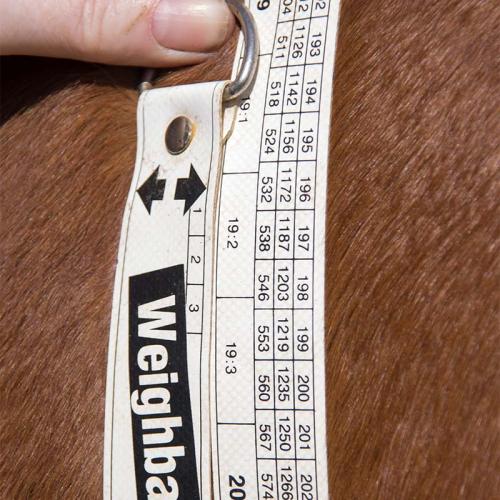There are lots of trainers – good trainers and bad trainers. This is a conversation that comes up a lot with equestrians of all disciplines and all skill levels. When is it time to move on from your current trainer?

Maintaining a healthy weight is essential for horses as they age. Carrying extra pounds can exacerbate a variety of problems that affect older horses including metabolic conditions and osteoarthritis. Here are a few tips to help keep your horse fit and trim.
Learn to use a weight tape and assess body condition score
If you don’t already have a weight tape for your horse, get one, learn how to use it, and measure your horse’s weight regularly. Most farm, feed, and tack stores carry weight tapes. While they are not as accurate as a scale, they generally provide a good approximation of your horse’s weight. They are also helpful for monitoring trends. Learning to body condition score your horse can also be very valuable in guiding weight management decisions. For most horses, an ideal body condition score is 4.5-5. If your horse has excessive body condition, getting him in a weight reduction program will help improve body condition and optimize health. Keeping track of body weight will help you keep track of progress, as well as inform feeding decisions.
Know how much you are actually feeding
Most horses that need to lose weight should be fed approximately 1.5-2% of body weight daily. The significant majority of that amount will be fed in forage. Weighing hay is a useful way of keeping track of the amount you are feeding. If further caloric reduction is necessary to achieve your horse’s weight loss goals, soaking hay in water before feeding can help. When trying to reduce weight, giving your horse a complete and balanced diet is essential for proper nutrition. Add a calculated amount of ration balancer to your feeding routine to ensure this is achieved.
Control excess calories through grazing and treats
Much like snacks can derail people when they are trying to lose weight, excessive treats and grazing can thwart your efforts to help your horse lose weight. Include calorie amounts from any treats given and estimates from grazing when calculating your horse’s total daily ration. Since turn-out can be an important part of an exercise plan, consider using a grazing muzzle to minimize extra calories from grazing. If giving treats are an important part of your bond with your horse, work with your veterinarian or equine nutritionist to find the most appropriate treats that fit with your horse’s weight loss plan.
Exercise your horse
Increasing exercise is an important part of any weight loss program. Exercising your horse 5-7 days per week for a minimum of 20 minutes will help facilitate weight loss. The more active the exercise, the more it will benefit your horse. Trotting or cantering is a great way to accomplish this task. If your horse has been relatively sedentary or out of work, it is important to slowly and gradually build up exercise. Walking for 5-10 minutes daily, and gradually adding time and increasing intensity over a period of several weeks is an ideal way to ease a horse back into shape, helping them to lose weight as they go.
Ask an expert for help
If you are a relative novice horse owner, or always had “easy keepers”, don’t hesitate to reach out to an expert for help designing a weight loss plan for your horse. Your veterinarian or an equine nutritionist can help. Many feed stores have nutritionists available for consultation. They can make recommendations on exercise, hay choices and amounts, grain, ration balancers, and other husbandry practices to help get your horse on track for successful weight loss. Additionally, they can provide valuable support to help you make progress.
Using these tips, being consistent in your efforts, and tracking progress with objective measures will be the best way for you to help your horse shed excess weight. Good luck with your efforts!
There are lots of trainers – good trainers and bad trainers. This is a conversation that comes up a lot with equestrians of all disciplines and all skill levels. When is it time to move on from your current trainer?
While you are working on New Year’s resolutions for yourself, consider making a few for your horse as well. Here are a few suggestions...
Maintaining a healthy weight is essential for horses as they age. Here are a few tips to help keep your horse fit and trim.
Would you know it if your horse was in pain? Even if you knew your horse was in pain, would you know what type of pain he or she was suffering from?